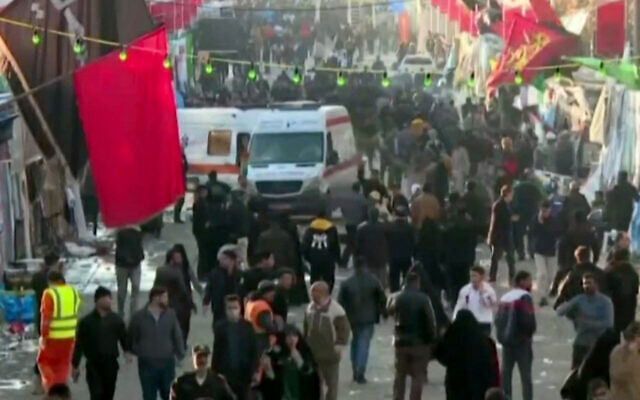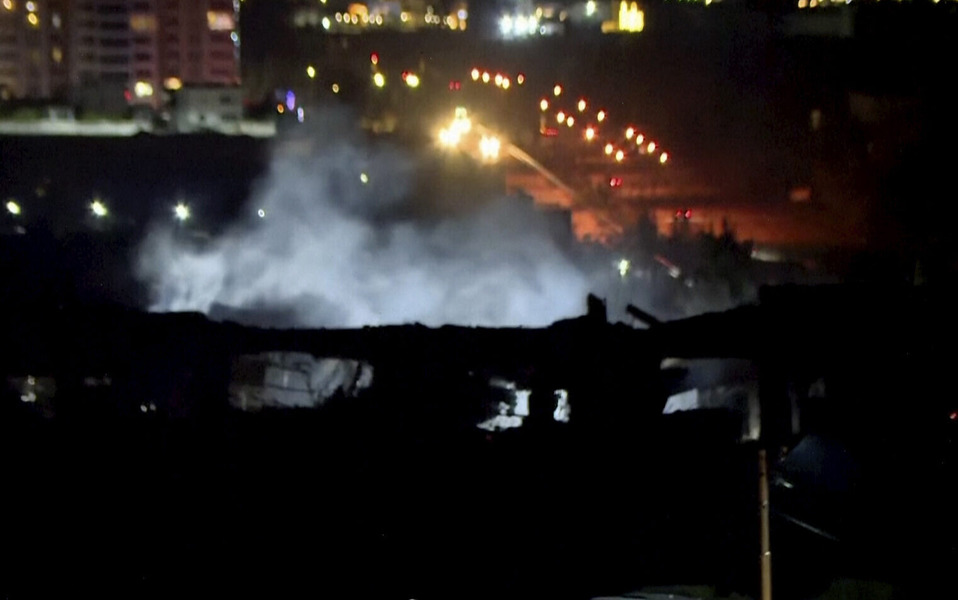Iraqi officials report 4 civilians killed in strikes that the Revolutionary Guards describe as a response to Israel recently ‘martyring IRGC and resistance commanders’ writes the times of israel.
Iran’s Islamic Revolutionary Guard Corps said it attacked the “espionage headquarters” of Israel in Iraq’s semi-autonomous Kurdistan region, state media reported late on Monday, while the elite force said it also struck in Syria against the Islamic State.
“Ballistic missiles were used to destroy espionage centers and gatherings of anti-Iranian terrorist groups in the region late tonight,” the IRGC in a statement, naming the Mossad spy agency.
The Revolutionary Guards described the strike on the purported spy facility as a “response to the recent evil acts of the Zionist regime in martyring IRGC and resistance commanders,” apparently referring to a strike in Syria that killed high-ranking IRGC Brig. Gen. Razi Mousavi and a pair of separate attacks in Lebanon that killed Hamas deputy leader Saleh al-Arouri and senior Hezbollah military commander Wissam al-Tawil. Both Arouri and Tawil had close links with Iran.
“We assure our nation that the Guards’ offensive operations will continue until avenging the last drops of martyrs’ blood,” the IRGC statement said.
In addition to the strikes near Kurdistan’s capital Erbil, the IRGC said it launched attacks against the “perpetrators of terrorist operations” in Iran, including the Islamic State.
Explosions were heard in an area some 40 kilometers (25 miles) northeast of Erbil in the Kurdistan region, three security sources said, in a neighborhood near the US consulate as well as civilian residences.
A US defense official who spoke on condition of anonymity to discuss details that had not been made public said the US tracked the missiles, which hit in northern Iraq and northern Syria, and no US facilities were struck or damaged in the attacks. The official said initial indications were that the strike were “reckless and imprecise.”

At least four civilians were killed and six injured in the strikes on Erbil, the Kurdistan government’s security council said in a statement, describing the attack as a “crime.”
Multimillionaire Kurdish businessman Peshraw Dizayee and several members of his family were among the dead, killed when at least one rocket crashed into their home, Iraqi security and medical sources said.
Dizayee, who was close to the ruling Barzani clan, owned businesses that led major real estate projects in Kurdistan.

Additionally, one rocket had fallen on the house of a senior Kurdish intelligence official and another on a Kurdish intelligence center, the security sources said.
Reuters could not independently verify any of the reports. Israeli government officials were not reachable for immediate comment.
Air traffic at Erbil airport was halted, the security sources said.
Iran has in the past sometimes carried out strikes in Iraq’s northern Kurdistan region, saying the area is used as a staging ground for Iranian separatist groups as well as agents of its arch-foe Israel.
The IRGC also said Monday the attack in Syria was in “response to the recent crimes of the terrorist groups that unjustly martyred a group of our dear compatriots in Kerman and Rask.”
Earlier this month, Islamic State claimed responsibility for two explosions in Iran’s southeastern Kerman city that killed nearly 100 people and wounded scores at a memorial for top commander Qassem Soleimani, who was killed in Baghdad by a US drone three years ago. Soleimani was head of the Quds Force, which was in charge of IRGC operations overseas.

In December, at least 11 Iranian police officers were killed in a jihadist-claimed attack on a police station in Rask, in the southeastern province of Sistan-Baluchistan.
That attack was claimed by Jaish al-Adl (Army of Justice) in a brief statement on its Telegram channel. The insurgency was formed in 2012 and is blacklisted by Iran as a terrorist group.
The Iranian strikes Monday came amid concerns of spiraling conflict through the Middle East amid the Israel-Hamas war in Gaza that was sparked by the Palestinian terror group’s devastating October 7 onslaught, in which some 1,200 people — mostly civilians — were killed and around 240 kidnapped. Following the atrocities three months ago and Israel’s subsequent military offensive aimed at destroying the Gaza-ruling Hamas, which has long been backed by Iran, Tehran’s allies have also entered the fray from Lebanon, Syria, Iraq and Yemen.
In addition to attacks on northern Israel by Lebanon’s Hezbollah terror group and on commercial shipping in the Red Sea by the Houthi rebels in Yemen, Iranian-backed militias in Iraq have launched near-daily drone attacks on bases housing US forces in Iraq and Syria, which the groups have said was in retaliation for Washington’s support of Israel, and in an attempt to force US troops to leave the region. There have also been attacks on Israel from both Iraq and Syria.

